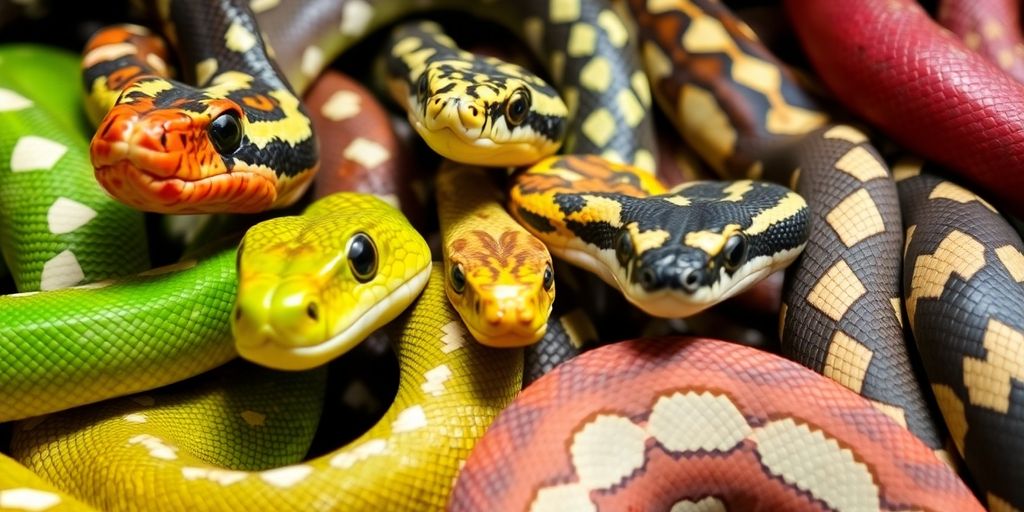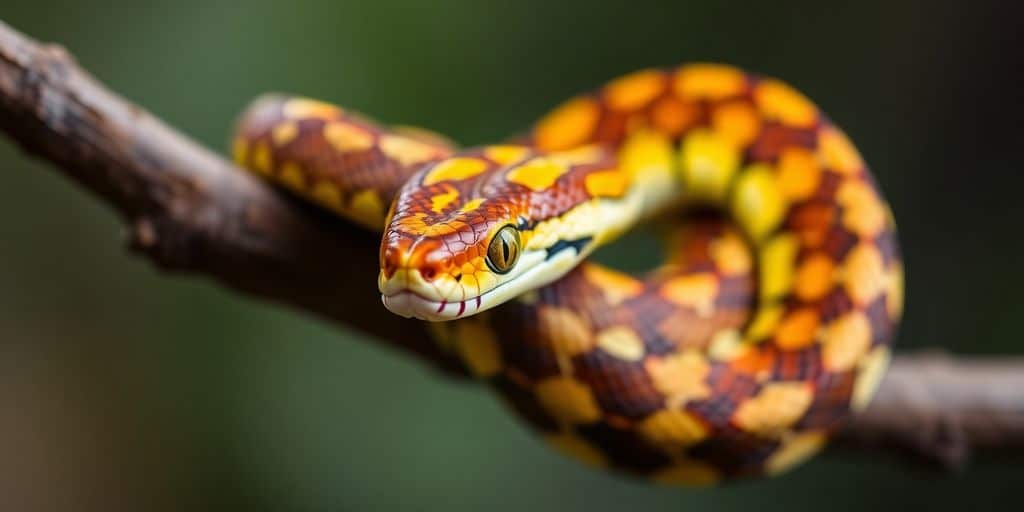If you’re fascinated by the world of snakes and considering adding a venomous snake to your collection, this guide is for you. We will explore the top venomous snakes available for sale, important factors to think about before buying, how to create the ideal home for your snake, and tips for handling them safely. Understanding these aspects will help ensure a rewarding experience for both you and your new scaly friend.
Key Takeaways
- Rattlesnakes, Copperheads, Coral Snakes, and Cottonmouths are popular choices for enthusiasts.
- Consider the snake’s temperament, habitat, feeding needs, and legal requirements before purchasing.
- Setting up the right enclosure is crucial for the snake’s health and comfort.
- Learn proper handling techniques to minimize stress and ensure safety for both you and the snake.
- Research reputable breeders and marketplaces to find healthy snakes.
Top Venomous Snakes for Sale
When it comes to venomous snakes for sale, enthusiasts have several exciting options. Here are some of the most popular choices:
Rattlesnakes
Rattlesnakes are well-known for their distinctive rattling sound. They are often found in various habitats across North America. Here are some key points about them:
- Price Range: $299.99 for Arizona Blacktail Rattlesnake
- Temperament: Generally defensive but can be handled with care.
- Habitat: Prefer rocky areas and can adapt to different environments.
Copperheads
Copperheads are recognized by their unique coloration and patterns. They are often found in wooded areas and are known for their striking appearance.
- Price Range: Typically around $150-$300.
- Temperament: Usually calm but can be aggressive if threatened.
- Habitat: Thrive in forests and near water sources.
Coral Snakes
Coral snakes are famous for their vibrant colors and potent venom. They are less common in the pet trade but are sought after by serious collectors.
- Price Range: Approximately $459.99 for aquatic coral snake.
- Temperament: Generally shy and prefer to avoid confrontation.
- Habitat: Found in tropical and subtropical regions.
Cottonmouths
Cottonmouths, also known as water moccasins, are semi-aquatic snakes that can be quite aggressive when provoked.
- Price Range: Around $200-$400.
- Temperament: Can be aggressive, especially when defending their territory.
- Habitat: Commonly found in swamps and marshes.
Remember: Always do thorough research before purchasing any venomous snakes for sale. Understanding their needs and behaviors is crucial for responsible ownership.
Factors to Consider When Buying Venomous Snakes

When thinking about getting a venomous snake, there are several important things to keep in mind. Understanding these factors can help ensure a safe and enjoyable experience.
Snake Temperament
- Different snakes have different personalities. Some may be calm, while others can be more aggressive.
- Research the specific species to know what to expect.
- Always handle with care, especially if the snake is known to be defensive.
Habitat Requirements
- Snakes need a proper environment to thrive. Here are some key points:
- Size of the enclosure: Make sure it’s big enough for the snake to move around.
- Temperature control: Snakes are cold-blooded and need a warm area to bask.
- Humidity levels: Different species require different humidity levels to stay healthy.
Feeding Needs
- Venomous snakes can be picky eaters. Consider the following:
- Diet type: Some prefer live prey, while others can eat frozen food.
- Feeding frequency: Young snakes may need to eat more often than adults.
- Prey size: Ensure the food is appropriate for the snake’s size.
Legal Considerations
- Check local laws regarding owning venomous snakes. Some areas have strict regulations.
- Ensure you have the necessary permits if required.
Remember, owning a venomous snake is a big responsibility. Make sure you are fully prepared before making a purchase!
Setting Up the Perfect Enclosure for Your Venomous Snake
Creating a safe and comfortable home for your venomous snake is essential. A well-designed enclosure can significantly improve your snake’s health and happiness. Here are some key aspects to consider:
Choosing the Right Tank
- Size Matters: Ensure the tank is spacious enough for your snake to move around comfortably.
- Material: Glass or plastic tanks are popular choices, but make sure they are escape-proof.
- Secure Lids: Always use a secure lid to prevent any escapes.
Temperature and Humidity Control
- Temperature Gradients: Provide a warm side and a cool side in the enclosure to help regulate your snake’s body temperature.
- Humidity Levels: Different species require different humidity levels. Use a hygrometer to monitor this.
- Heating Elements: Consider using heat mats or lamps to maintain the right temperature.
Substrate and Decor
- Bedding Options: Use safe substrates like aspen shavings or paper towels. Avoid cedar or pine shavings as they can be harmful.
- Hiding Spots: Include hide boxes where your snake can feel secure. This is especially important for shy species.
- Climbing Structures: If your snake is semi-arboreal, provide branches or shelves for climbing.
Safety Measures
- Quarantine New Snakes: Always quarantine new snakes in a sterile environment with minimal furniture. This helps prevent the spread of diseases.
- Regular Cleaning: Keep the enclosure clean to avoid health issues. Regularly remove waste and replace substrate.
- Ventilation: Ensure proper ventilation to prevent respiratory issues.
Setting up the right environment is crucial for your snake’s well-being. Take the time to research and prepare before bringing your new pet home.
Health and Safety Tips for Handling Venomous Snakes

Proper Handling Techniques
Handling venomous snakes requires careful attention to safety. Here are some key points to remember:
- Always use a snake hook or tongs to avoid direct contact.
- Wear protective gloves and long sleeves.
- Keep the snake’s head pointed away from you.
Recognizing Signs of Stress
Understanding when a snake is stressed is crucial for both your safety and the snake’s well-being. Look for:
- Rapid tongue flicking
- Hissing or defensive postures
- Refusal to eat
First Aid for Snake Bites
In case of a snake bite, immediate action is essential. Follow these steps:
- Call emergency services right away.
- Keep the affected area still and below heart level.
- Remove any tight clothing or jewelry near the bite.
Regular Health Checkups
Regular veterinary visits are important for your snake’s health. Schedule checkups to:
- Ensure your snake is free from parasites.
- Monitor its weight and overall health.
- Get advice on proper care and feeding.
Taking precautions when handling venomous snakes is vital. Always prioritize safety to enjoy a rewarding experience with these fascinating creatures.
Where to Buy Venomous Snakes
Finding the right place to purchase venomous snakes is crucial for both safety and quality. Here are some reliable options:
Reputable Breeders
- Look for breeders who specialize in venomous snakes.
- Ensure they provide health guarantees and proper documentation.
- Check reviews and ask for references from previous customers.
Online Marketplaces
- Websites like morphmarket offer a large selection of captive-bred reptiles for sale from trusted breeders.
- Always verify the seller’s credentials and read customer feedback.
- Be cautious of shipping regulations in your area.
Exotic Pet Shows
- Attend local or national exotic pet shows to meet breeders in person.
- This allows you to see the snakes and ask questions directly.
- You can often find unique species not available elsewhere.
Rescue Centers
- Some rescue centers may have venomous snakes available for adoption.
- This is a great way to provide a home for a snake in need.
- Ensure you have the proper permits and knowledge to care for them.
Always prioritize safety and legality when purchasing venomous snakes. Make sure you are well-informed about the responsibilities that come with owning these reptiles.
Common Myths About Venomous Snakes
Venomous Snakes Are Always Aggressive
Many people think that all venomous snakes are aggressive. This is not true! In fact, many species are quite calm and prefer to avoid confrontation. Understanding their behavior can help dispel this myth.
All Venomous Snakes Are Deadly
Another common belief is that every venomous snake can kill a human. While some snakes have potent venom, others are less dangerous. For example, the copperhead has a mild venom that rarely causes serious harm to humans.
Venomous Snakes Can’t Be Pets
Some enthusiasts believe that venomous snakes are not suitable as pets. However, with proper care and knowledge, many people successfully keep them. It’s essential to understand their needs and handle them safely.
Venomous Snakes Are Hard to Care For
While they do require special care, many venomous snakes can thrive in captivity if their habitat is set up correctly. Here are some key points to consider:
- Research the specific needs of the species.
- Ensure proper temperature and humidity levels.
- Provide a secure and comfortable enclosure.
Keeping venomous snakes can be rewarding, but it requires dedication and responsibility. Always prioritize safety and education.
Summary of Common Myths
|
Myth |
Truth |
|
Venomous snakes are always aggressive |
Many are calm and avoid confrontation. |
|
All venomous snakes are deadly |
Some have mild venom and are not life-threatening. |
|
Venomous snakes can’t be pets |
With proper care, they can be kept as pets. |
|
Venomous snakes are hard to care for |
They require specific care but can thrive in captivity. |
Understanding these myths can help potential snake owners make informed decisions and appreciate these fascinating creatures better.
Final Thoughts on Venomous Snakes as Pets
In conclusion, owning a venomous snake can be an exciting adventure for those who are well-prepared. It’s essential to do your homework and understand the specific needs of each snake type. Remember, not all snakes are friendly, and some can be dangerous. Make sure to create a safe and comfortable home for your snake, and always prioritize its health and well-being. If you’re ready to take on the responsibility, you can enjoy the unique experience of having a venomous snake as a pet. Happy snake keeping!
Frequently Asked Questions
What are some popular venomous snakes that can be pets?
Some well-known venomous snakes that people sometimes keep as pets include rattlesnakes, copperheads, and coral snakes. However, owning these snakes requires special care and knowledge.
How do I know if a venomous snake is healthy?
A healthy venomous snake should be active, have clear eyes, and show no signs of weight loss. Regular vet checkups can help ensure they stay healthy.
What should I feed my venomous snake?
Venomous snakes typically eat small mammals, birds, or even fish, depending on the species. It’s important to research the specific dietary needs of your snake.
Is it legal to own venomous snakes?
Laws about owning venomous snakes vary by state and country. Always check local regulations before considering getting one.
How can I safely handle a venomous snake?
Handling venomous snakes should be done with extreme caution. Always use proper tools like hooks and gloves, and ensure you have experience or guidance from a professional.
What kind of habitat do venomous snakes need?
Venomous snakes need a secure enclosure that mimics their natural habitat, including proper temperature, humidity, and hiding spots.

yes